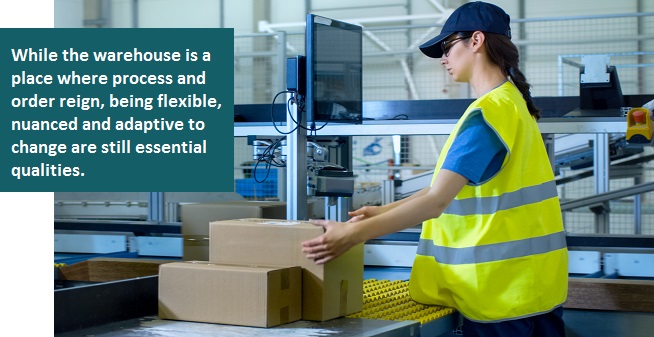As businesses look to fulfill more e-commerce orders on a shorter timeline, warehouse automation is frequently cited as one of the most effective ways to reduce cost, time, and error in the supply chain. In an industry where efficiency is key, automated tasks and equipment can help take the burden off of the labor force and boost overall warehouse productivity. Automation can help your warehouse and supply chain run as smoothly as possible in order to make your business as successful as it can be.
The mainstream conversation surrounding warehouse automation is fraught with anxieties about warehouse job security and robot takeover. At Dehnco, we’re interested in solutions and technology that improve workflow as well as worker comfort and safety. While automation and AI-based technologies are developing at an incredibly rapid pace, for the majority of businesses, the cost to fully implement all of these technologies is still not feasible. The fully automated warehouse is coming, but not for a while, and for only a very small percentage of businesses.
For the foreseeable future, robots and AI-based technologies are not “replacing” warehouse workers, but are being used to improve warehouse flow and simplify day-to-day tasks . While the warehouse is a place where process and order reign, being flexible, nuanced and adaptive to change are still essential qualities. Robots at this time do not have the same dexterity or course-correcting abilities as humans do. Plus, someone needs to maintain and program all those machines.

Automation can be implemented across the supply chain and can most significantly aid workers in picking, packing, sorting, receiving, and shipping. Day in and day out, everything that flows in and out of the warehouse must be documented, tracked, verified, and double-checked to ensure inventory quality and customer satisfaction. When these tasks are performed manually, not only do they take longer, but there’s a greater chance for error, especially when it comes to things like data entry or inventory management. In a warehouse, while some tasks are repetitive, detail-oriented, error-prone and time consuming, seemingly making the case for fully automated processes, there are still a number of tasks that require human insight and execution.
Some increasingly popular and practical examples of warehouse automation include voice-activated and hands-free technology, cloud-based warehouse management systems, self-driving lifts and carts, sophisticated conveyor belts, as well as robotic pickers and packers.
While all of these things sound fancy, automation and AI-based solutions certainly aren’t just for e-commerce giants. According to Tractica, warehouse automation technology sales are expected to reach a market value of $22.4 billion by the end of 2021. The “Amazon Effect” has pushed smaller and mid-sized businesses to take a closer look at their operations as they attempt to meet customer demands and remain competitive in the marketplace.
Automation for automation’s sake isn’t the answer; there is no one-size-fits-all solution. All newly implemented automated processes and equipment should ultimately work to support your staff and improve your warehouse function and layout. Automated tasks and tools work best when warehouse staff is properly educated on how to use equipment and are already intimately familiar with product and workflow throughout the warehouse. Automation is meant to make everyone’s lives easier, not more difficult.
Automation can cut down on warehouse workers’ daily physical strain, personal errors, and inefficiencies; it reduces operating and fulfillment costs, while increasing productivity, accuracy, and throughput. While the human warehouse worker is as important as ever, automation technology is only beginning to take root, opening endless possibilities to improve and optimize warehouse performance.






























